Adafruit ESP32 Feather
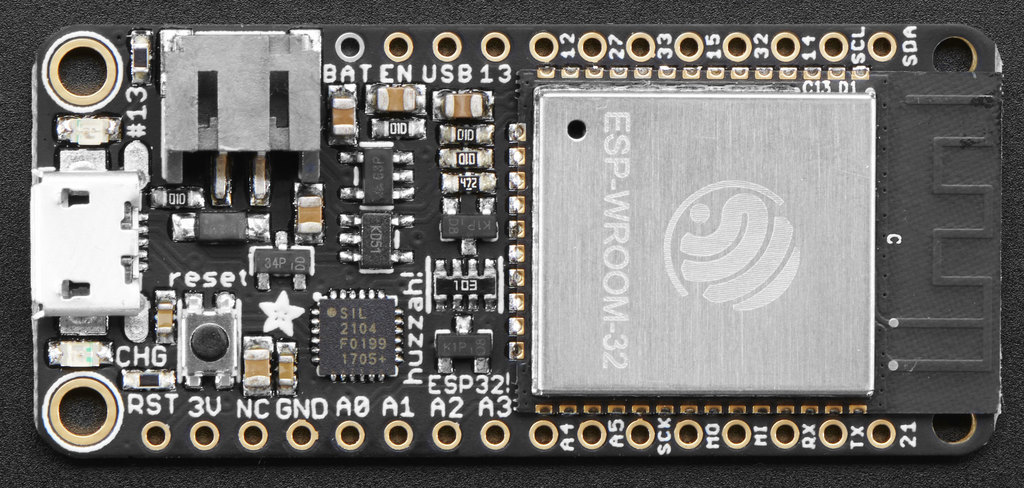
Features
These are the SDK features that are currently available on the Adafruit ESP32 Feather board
Cpp-Client
API
| Blocks | Supported |
|---|---|
get(const char* const blockId) | ✅ |
all(int limit, int page) | ✅ |
transactions(const char* const blockId) | ✅ |
search(const std::map<std::string, std::string>& bodyParameters, int limit, int page) | ✅ |
| Delegates | Supported |
|---|---|
get(const char *const identifier) | ✅ |
all(int limit, int page) | ✅ |
blocks(const char *const identifier, int limit, int page) | ✅ |
voters(const char *const identifier, int limit, int page) | ✅ |
| Node | Supported |
|---|---|
configuration() | ✅ |
status() | ✅ |
syncing() | ✅ |
| Peers | Supported |
|---|---|
get(const char* const ip) | ✅ |
all(int limit, int page) | ✅ |
| Transactions | Supported |
|---|---|
getUnconfirmed(const char* const identifier) | ✅ |
get(const char* const identifier) | ✅ |
all(int limit, int page) | ✅ |
allUnconfirmed(int limit, int page) | ✅ |
types() | ✅ |
search(const std::map<std::string, std::string>& body_parameters, int limit, int page) | ✅ |
| Votes | Supported |
|---|---|
get(const char* const identifier) | ✅ |
all(int limit, int page) | ✅ |
| Wallets | Supported |
|---|---|
get(const char *const identifier) | ✅ |
all(int limit, int page) | ✅ |
top(int limit, int page) | ✅ |
transactions(const char *const identifier, int limit, int page) | ✅ |
transactionsReceived(const char *const identifier, int limit, int page) | ✅ |
transactionsSent(const char *const identifier, int limit, int page) | ✅ |
votes(const char *const identifier, int limit, int page) | ✅ |
search(const std::map<std::string, std::string> &bodyParameters, int limit, int page) | ✅ |
Cpp-Crypto
Configuration
| Fee | Supported |
|---|---|
get(int type) | ✅ |
set(int type, uint64_t fee) | ✅ |
| Network | Supported |
|---|---|
get() | ✅ |
set(const AbstractNetwork& network) | ✅ |
Enums
| Enum | Supported |
|---|---|
| Fees | ✅ |
| Types | ✅ |
Identities
| Address | Supported |
|---|---|
toBytes() | ✅ |
toString() | ✅ |
fromPassphrase(const char *const passphrase, uint8_t networkVersion) | ✅ |
fromPrivateKey(PrivateKey privateKey, uint8_t networkVersion) | ✅ |
fromPublicKey(PublicKey publicKey, uint8_t networkVersion) | ✅ |
validate(Address address, uint8_t networkVersion) | ✅ |
validate(const char *const addressStr, uint8_t networkVersion) | ✅ |
validate(const uint8_t *addressBytes, uint8_t networkVersion) | ✅ |
base58encode(const uint8_t *source) | ✅ |
bytesFromBase58Check(const char *const address) | ✅ |
| Mnemonic | Supported |
|---|---|
generate(size_t num_words = 12u, Language language) | ✅ |
| PrivateKey | Supported |
|---|---|
toBytes() | ✅ |
toString() | ✅ |
fromPassphrase(const char *const passphrase) | ✅ |
fromHex(const char *const privateKey) | ✅ |
fromWIFString(const char *wifStr, uint8_t wifByte) | ✅ |
validate(PrivateKey privateKey) | ✅ |
validate(const char *privateKeyStr) | ✅ |
validate(const uint8_t *privateKeyBytes) | ✅ |
| PublicKey | Supported |
|---|---|
toBytes() | ✅ |
toString() | ✅ |
isValid() | ✅ |
fromPassphrase(const char *const passphrase) | ✅ |
fromHex(const char *const publicKey) | ✅ |
fromPrivateKey(PrivateKey privateKey) | ✅ |
validate(PublicKey publicKey) | ✅ |
validate(const char *publicKeyStr) | ✅ |
validate(const uint8_t *publicKeyBytes) | ✅ |
| WIF | Supported |
|---|---|
toBytes() | ✅ |
toString() | ✅ |
fromPassphrase(const char *const passphrase, uint8_t wifByte) | ✅ |
Transactions
| Builder | Supported |
|---|---|
buildTransfer(std::string recipientId, uint64_t amount, std::string vendorField, std::string passphrase std::string secondPassphrase = "") | ✅ |
buildSecondSignatureRegistration(std::string passphrase, std::string secondPassphrase = "") | ✅ |
buildDelegateRegistration(std::string username, std::string passphrase, std::string secondPassphrase = "") | ✅ |
buildVote(std::vector<std::string> votes, std::string passphrase, std::string secondPassphrase = "") | ✅ |
buildMultiSignatureRegistration(uint8_t min, uint8_t lifetime, std::vector<std::string> keysgroup, std::string passphrase, std::string secondPassphrase = "") | ✅ |
| Deserializer | Supported |
|---|---|
deserialize() | ✅ |
| Serializer | Supported |
|---|---|
serialize() | ✅ |
| Transaction | Supported |
|---|---|
getId() | ✅ |
sign(const char* passphrase) | ✅ |
secondSign(const char* passphrase) | ✅ |
verify() | ✅ |
secondVerify(const char* secondPublicKey) | ✅ |
toBytes(bool skipSignature = true, bool skipSecondSignature = true) | ✅ |
Utils
| Message | Supported |
|---|---|
sign(std::string newMessage, const char *const passphrase) | ✅ |
verify() | ✅ |
toArray() | ✅ |
toJson() | ✅ |
toString() | ✅ |
| Slot | Supported |
|---|---|
time(Crypto::Networks::AbstractNetwork network) | ✅ |
epoch(Crypto::Networks::AbstractNetwork network) | ✅ |
Specs
These are the specifications for the Adafruit ESP32 Feather board.
The HUZZAH32 is our ESP32-based Feather, made with the official WROOM32 module. We packed everything you love about Feathers: built in USB-to-Serial converter, automatic bootloader reset, Lithium Ion/Polymer charger, and just about all of the GPIOs brought out so you can use it with any of our Feather Wings.
That module nestled in at the end of this Feather contains a dual-core ESP32 chip, 4 MB of SPI Flash, tuned antenna, and all the passives you need to take advantage of this powerful new processor. The ESP32 has both WiFi and Bluetooth Classic/LE support. That means it's perfect for just about any wireless or Internet-connected project.
The ESP32 is a perfect upgrade from the ESP8266 that has been so popular. In comparison, the ESP32 has way more GPIO, plenty of analog inputs, two analog outputs, multiple extra peripherals (like a spare UART), two cores so you don't have to yield to the WiFi manager, much higher-speed processor, etc. etc! We think that as the ESP32 gets traction, we'll see more people move to this chip exclusively, as it is so full-featured.
Source: Adafruit.com
- 240 MHz dual core Tensilica LX6 microcontroller with 600 DMIPS
- Integrated 520 KB SRAM
- Integrated 802.11b/g/n HT40 Wi-Fi transceiver, baseband, stack and LWIP
- Integrated dual mode Bluetooth (classic and BLE)
- 4 MByte flash include in the WROOM32 module
- On-board PCB antenna
- Ultra-low noise analog amplifier
- Hall sensor
- 10x capacitive touch interface
- 32 kHz crystal oscillator
- 3 x UARTs (only two are configured by default in the Feather Arduino IDE support, one UART is used for bootloading/debug)
- 3 x SPI (only one is configured by default in the Feather Arduino IDE support)
- 2 x I2C (only one is configured by default in the Feather Arduino IDE support)
- 12 x ADC input channels
- 2 x I2S Audio
- 2 x DAC
- PWM/timer input/output available on every GPIO pin
- OpenOCD debug interface with 32 kB TRAX buffer
- SDIO master/slave 50 MHz
- SD-card interface support
Pinout
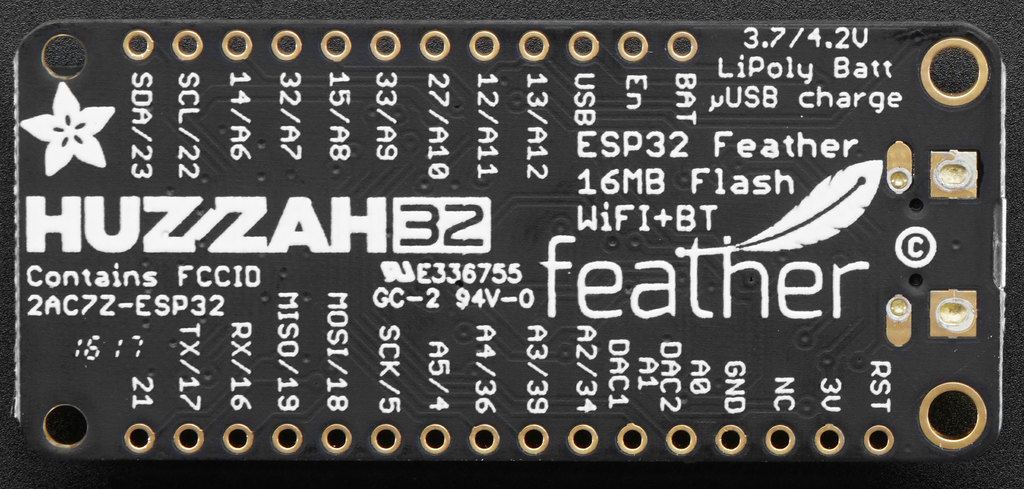
Top row
- BAT - this is the positive voltage to/from the JST jack for the optional Lipoly battery
- EN - this is the 3.3V regulator's enable pin.
It's pulled up, so connect to ground to disable the 3.3V regulator
- USB - this is the positive voltage to/from the micro USB jack if connected
- 13/A12 - This is GPIO #13 / analog input A12
also connected to the red LED next to the USB port
- 12/A11 - This is GPIO #12 / analog input A11
This pin has a pull-down resistor built into it, we recommend using it as an output only, or making sure that the pull-down is not affected during boot.
- 27/A10 - This is GPIO #27 / analog input A10
- 33/A9 - This is GPIO #33 / analog input A9
it can also be used to connect a 32 KHz crystal.
- 15/A8 - This is GPIO #15 / analog input A8
- 32/A7 - This is GPIO #32 / analog input A7
It can also be used to connect a 32 KHz crystal.
- 14/A6 - This is GPIO #14 / analog input A6
- SCL/22 - Serial Clock Line / GPIO #22
- SDA/23 - Serial Data Line / GPIO #23
*note that the I2C pins do not have pullup resistors already! You must add them if you want to communicate with an I2C device
Bottom row
- RST - this is the reset pin for the ESP8266,
- pulled high by default. When pulled down to ground momentarily it will reset the ESP32 system. This pin is 3.3V logic only
- 3V - this is the output from the 3.3V regulator.
The regulator can supply 500mA peak but half of that is drawn by the ESP32, and it's a fairly power-hungry chip. So if you need a ton of power for stuff like LEDs, motors, etc. Use the USB or BAT pins, and an additional regulator
- NC - No Connection
- GND - this is the common ground for all power and logic
- A0/26 - this is an analog input A0 / GPIO #26
- also analog output DAC2.
- A1/25 - this is an analog input A1 / GPIO #25
- also analog output DAC1.
- A2/34 - this is an analog input A2 / GPIO #34
note it is not an output-capable pin!
- A3/39 - this is an analog input A3 GPIO #39
note it is not an output-capable pin!
- A4/36 - this is an analog input A4 / GPIO #36
note it is not an output-capable pin!
- A5/4 - this is an analog input A5 / GPIO #4
- SCK/5 - System Clock
- MOSI/18 - Master Out / Slave In
- MISO/19 - Master In / Slave Out
- RX/16 - this is the input into the module.
both are 3.3V logic
- TX/17 - this is the output from the module
- 21 - General purpose IO pin #21
- https://www.adafruit.com/product/3405
External Resources
- Adafruit Feather Huzzah ESP8266 Overview
- Espressif ESP32 Overview
- Espressif ESP32 Datasheet (PDF)
- Espressif ESP32 Technical Sheet (PDF)
Troubleshooting
Setup
These are the steps to setup your Adafruit ESP32 Feather board.
1. Add ESP32 to the Arduino IDE
To add ESP32 to the Arduino IDE, use 'Additional Boards Manager URL's' in 'Preferences'; this is a line separated list of hardware configuration JSON configs.
Preferences >> Additional Boards Manager URL's
Add the following URL to the list:
https://dl.espressif.com/dl/package_esp32_index.json
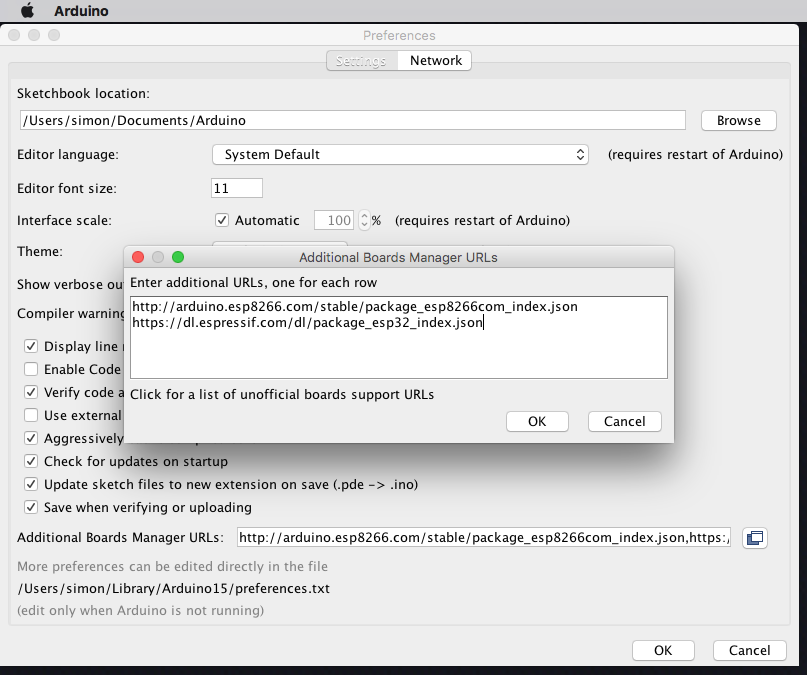
2. Download the ESP32 packages via Board Manager
Open the Boards Manager from the Tools dropdown menu:
Tools >> Board >> Boards Manager
Search for and install the 'ESP32' package in Boards Manager.
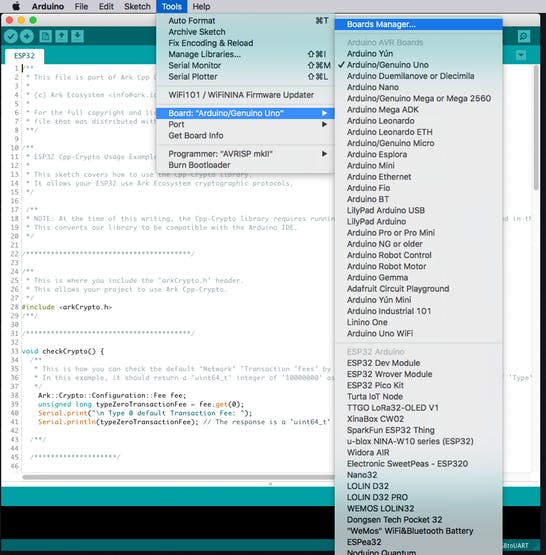
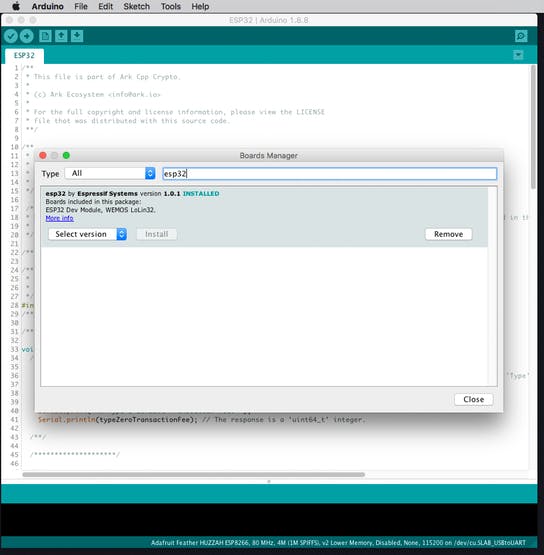
3. Select your Board
From the Tools dropdown menu:
Tools >> Board
Select the Adafruit ESP32 Feather board
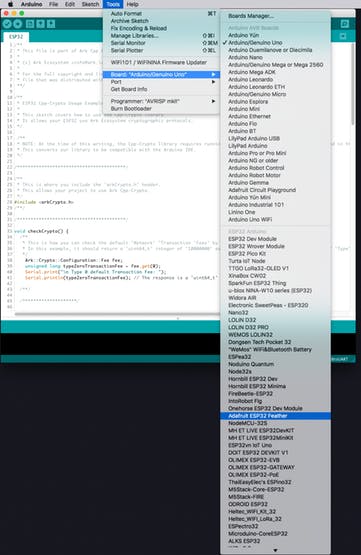
4. Install the USB driver
For your system to be able to talk to the ESP32 via USB, you will also need to install the SiLabs CP2104 Driver.
You can download the zip file for your operating system from the following website:
https://www.silabs.com/products/development-tools/software/usb-to-uart-bridge-vcp-drivers
e.g.
- Linux_3.x.x_4.x.x_VCP_Driver_Source.zip
- Mac_OSX_VCP_Driver.zip
- CP210x_VCP_Windows.zip
Unzip the downloaded file and run the installation package inside the unzipped folder.
Example
Pictures of an installation process of the CP2104 USB Driver for macOS systems can be found here.
Examples
Client - Arduino Sketch
ESP32.ino
/**
* This file is part of Swipechain Cpp Client.
*
* (c) Swipechain <info@swipechain.org>
*
* For the full copyright and license information, please view the LICENSE
* file that was distributed with this source code.
**/
/**
* This sketch covers how to use the Cpp-Client API.
* It allows your ESP32 to send requests to an Swipechain Node
*/
/**
* NOTE: At the time of this writing, the Cpp-Client library requires running the 'ARDUINO_IDE.sh' bash script located in the 'extras' folder.
* This converts our library to be compatible with the Arduino IDE.
*/
/****************************************/
/**
* This is where you include the 'arkClient.h' header.
* This allows your project to use Swipechain Cpp-Client.
*/
#include <arkClient.h>
/**/
/****************************************/
/**
* This is where you include WiFi header for your board.
* This example is for the ESP32, and includes the 'WiFi.h' header.
*/
#include <WiFi.h>
/**/
/****************************************/
/* This is the WiFi network you'd like your board to connect to. */
const char* ssid = "yourSSID";
const char* password = "yourWiFiPassword";
/**/
/****************************************/
/**
* This is the IP address of an Swipechain Node
* Specifically, this is a Devnet V2 Node IP
* You can find more peers here: https://github.com/SwipeChain/peers
*
* The Public API port for the V2 Swipechain network is '4003'
*/
const char* peer = "167.114.29.55";
int port = 4003;
/**/
/****************************************/
/**
* This is how you define a connection while speficying the API class as a 'template argument'
* You instantiate a connection by passing a IP address as a 'c_string', and the port as an 'int'.
*/
Swipechain::Client::Connection<Swipechain::Client::Api> connection(peer, port);
/**/
/****************************************/
void checkAPI() {
/**
* This is how you can check the Version of the API
* In this example, it should return '2' as an 'int' for V2 of Swipechains' API.
*/
auto apiVersion = connection.api.version();
Serial.print("\nAPI Version: ");
Serial.println(apiVersion);
/**/
/********************/
/**
* Here you can call a list of 'All' 'Blocks' on the network.
* The '2' and '1' refer to the pagination (e.g. response limit and how many pages)
*
* This is equivalant to calling '167.114.29.49:4003/api/v2/blocks?limit=2&page=1'
*
* The response should be a json-formatted object
* The "pretty print" version would look something like this
*
* {
* "meta": {
* "count": 2,
* "pageCount": 597291,
* "totalCount": 1194581,
* "next": "\/api\/v2\/blocks?limit=2&page=2",
* "previous": null,
* "self": "\/api\/v2\/blocks?limit=2&page=1",
* "first": "\/api\/v2\/blocks?limit=2&page=1",
* "last": "\/api\/v2\/blocks?limit=2&page=597291"
* },
* "data": [
* {
* "id": "9809002764916365223",
* "version": 0,
* "height": 1178071,
* "previous": "10476150126412446830",
* "forged": {
* "reward": 200000000,
* "fee": 0,
* "total": 200000000,
* "amount": 0
* },
* "payload": {
* "hash": "e3b0c44298fc1c149afbf4c8996fb92427ae41e4649b934ca495991b7852b855",
* "length": 0
* },
* "generator": {
* "username": "darkcrow",
* "address": "DFSUsSmcVUhVZYQ1nowciWmmtnj1kvZK5Z",
* "publicKey": "03a8ff0a3cbdcb3bfbdb84dbf83226f338ba1452047ac5b8228a1513f7f1de80de"
* },
* "signature": "304402207fd861e98aa5e4ea0c4a828ad9104bb636b429bc73dc0d5bfe3515347e8b1a79022051f8fb3b3752f1204e8c425d0528203942756811d669c7dd1ccb15ff7bc14e09",
* "transactions": 0,
* "timestamp": {
* "epoch": 57144626,
* "unix": 1547245826,
* "human": "2019-01-11T22:30:26.000Z"
* }
* },
* {
* "id": "10476150126412446830",
* "version": 0,
* "height": 1178070,
* "previous": "1656548224477584335",
* "forged": {
* "reward": 200000000,
* "fee": 0,
* "total": 200000000,
* "amount": 0
* },
* "payload": {
* "hash": "e3b0c44298fc1c149afbf4c8996fb92427ae41e4649b934ca495991b7852b855",
* "length": 0
* },
* "generator": {
* "username": "genesis_16",
* "address": "DHg1jYVS23D6GP7RuhckuJsYAr6crH6c3Z",
* "publicKey": "03c57b6a3eb7d01ade51f95c8ae4e8ebeb7ca7b8422ab0fb2a236de5d1a5bc6a1b"
* },
* "signature": "304402201e548ee45d835a7edda9cddbe26530563c1aceebbb25ebf89966eed8fec5d0e40220140aee033d42562b22c73f097249e9a59cef24a2a7e1c887c7a16691445c2987",
* "transactions": 0,
* "timestamp": {
* "epoch": 57144618,
* "unix": 1547245818,
* "human": "2019-01-11T22:30:18.000Z"
* }
* }
* ]
* }
*
*/
const auto blocksResponse = connection.api.blocks.all(2, 1);
Serial.print("\nBlocks Response: ");
Serial.println(blocksResponse.c_str()); // The response is a 'std::string', to Print on Arduino, we need the c_string type.
/**/
/********************/
/**
* The following method can be used to search for a speficit Delegate.
* In this case, 'boldninja'.
*
* This is equivalant to calling '167.114.29.49:4003/api/v2/delegates/boldninja'
*
* The response should be a json-formatted object
* The "pretty print" version would look something like this:
*
* {
* "data": {
* "username": "boldninja",
* "address": "DKrACQw7ytoU2gjppy3qKeE2dQhZjfXYqu",
* "publicKey": "023ee98f453661a1cb765fd60df95b4efb1e110660ffb88ae31c2368a70f1f7359",
* "votes": 4970515580299,
* "rank": 27,
* "blocks": {
* "produced": 23867,
* "missed": 439,
* "last": {
* "id": "13492733628654518284",
* "height": 1178126,
* "timestamp": {
* "epoch": 57145090,
* "unix": 1547246290,
* "human": "2019-01-11T22:38:10.000Z"
* }
* }
* },
* "production": {
* "approval": 0.04,
* "productivity": 98.19
* },
* "forged": {
* "fees": 103507430299,
* "rewards": 4731200000000,
* "total": 4834707430299
* }
* }
* }
*/
const auto delegateResponse = connection.api.delegates.get("boldninja");
Serial.print("\nDelegate Response: ");
Serial.println(delegateResponse.c_str()); // The response is a 'std::string', to Print on Arduino, we need the c_string type.
/**/
/********************/
/**
* The following method can be used to get the Status of a Node.
*
* This is equivalant to calling '167.114.29.49:4003/api/v2/node/status'
*
* The response should be a json-formatted object
* The "pretty print" version would look something like this:
*
* {
* "data": {
* "synced": true,
* "now": 1178395,
* "blocksCount": 0
* }
* }
*/
const auto nodeStatus = connection.api.node.status();
Serial.print("\nNode Status: ");
Serial.println(nodeStatus.c_str()); // The response is a 'std::string', to Print on Arduino, we need the c_string type.
/**/
/********************/
/**
* The following method can be used to get a list of 'All' 'Peers' on the network.
*
* The '2' and '1' refer to the pagination (e.g. response limit and how many pages)
*
* This is equivalant to calling 'http://167.114.29.49:4003/api/v2/peers?limit=2&page=1'
*
* The response should be a json-formatted object
* The "pretty print" version would look something like this:
*
* {
* "meta": {
* "count": 2,
* "pageCount": 46,
* "totalCount": 91,
* "next": "\/api\/v2\/peers?limit=2&page=2",
* "previous": null,
* "self": "\/api\/v2\/peers?limit=2&page=1",
* "first": "\/api\/v2\/peers?limit=2&page=1",
* "last": "\/api\/v2\/peers?limit=2&page=46"
* },
* "data": [
* {
* "ip": "213.32.9.98",
* "port": 4002,
* "version": "2.1.0",
* "height": 1178420,
* "status": 200,
* "os": "linux",
* "latency": 15,
* "hashid": "1c254aa0"
* },
* {
* "ip": "137.74.237.196",
* "port": 4002,
* "version": "2.1.0",
* "height": 1178420,
* "status": 200,
* "os": "linux",
* "latency": 20,
* "hashid": "64e290cc"
* }
* ]
* }
*/
const auto allPeers = connection.api.peers.all(2, 1);
Serial.print("\nAll Peers: ");
Serial.println(allPeers.c_str()); // The response is a 'std::string', to Print on Arduino, we need the c_string type.
/**/
/********************/
/**
* The following method can be used to get a list of 'Transaction' 'Types'.
*
* This is equivalant to calling 'http://167.114.29.49:4003/api/v2/transactions/types'
*
* The response should be a json-formatted object
* The "pretty print" version would look something like this:
*
* {
* "data": {
* "Transfer": 0,
* "SecondSignature": 1,
* "DelegateRegistration": 2,
* "Vote": 3,
* "MultiSignature": 4,
* "Ipfs": 5,
* "TimelockTransfer": 6,
* "MultiPayment": 7,
* "DelegateResignation": 8
* }
* }
*/
const auto transactionTypes = connection.api.transactions.types();
Serial.print("\nTransaction Types: ");
Serial.println(transactionTypes.c_str()); // The response is a 'std::string', to Print on Arduino, we need the c_string type.
/**/
/********************/
/**
* This method can be used to get a list of 'Vote' Transactions.
* The '2' and '1' refer to the pagination (e.g. response limit and how many pages)
*
* This is equivalant to calling 'http://167.114.29.49:4003/api/v2/votes?limit=2&page=1'
*
* The response should be a json-formatted object
* The "pretty print" version would look something like this:
*
* {
* "meta": {
* "count": 2,
* "pageCount": 6962,
* "totalCount": 13924,
* "next": "\/api\/v2\/votes?limit=2&page=2",
* "previous": null,
* "self": "\/api\/v2\/votes?limit=2&page=1",
* "first": "\/api\/v2\/votes?limit=2&page=1",
* "last": "\/api\/v2\/votes?limit=2&page=6962"
* },
* "data": [
* {
* "id": "315481aa6f8023beb5e0e89ab2b35f11e2fda3f3f34003e6ff563517fe497e0b",
* "blockId": "8426118737032066166",
* "version": 1,
* "type": 3,
* "amount": 0,
* "fee": 80494853,
* "sender": "DQjc6E6WAH7PNtPUNALjZmkyk5yU34RTkU",
* "recipient": "DQjc6E6WAH7PNtPUNALjZmkyk5yU34RTkU",
* "signature": "30450221009095883cb1e4ddab2724a9c7473ca12fd40f390765776e1258375859beb05f12022023d845fd9ce1e424a54adf056e3915ca2a2e9c55a6ea6713639e3da781263df5",
* "asset": {
* "votes": [
* "+033cce8deb934704f07c994f2f5cfe54d59e061aad8e2f7fc982e4fe978d312a43"
* ]
* },
* "confirmations": 11466,
* "timestamp": {
* "epoch": 57049890,
* "unix": 1547151090,
* "human": "2019-01-10T20:11:30.000Z"
* }
* },
* {
* "id": "8484b6de30fe2cc51e7c1844dfae436ba56de3280182e87ff37f1aab7a2d3aa3",
* "blockId": "4417493337461919261",
* "version": 1,
* "type": 3,
* "amount": 0,
* "fee": 80494853,
* "sender": "DQjc6E6WAH7PNtPUNALjZmkyk5yU34RTkU",
* "recipient": "DQjc6E6WAH7PNtPUNALjZmkyk5yU34RTkU",
* "signature": "30440220486bfed2fafdc4b56cd271cceff7849e952776ec10dcfa66ac172f21b9146f8302200751d94d938b0db033019c02ecf9a831fb228e025c5ecbd7a5b5ee8f8634fb1f",
* "asset": {
* "votes": [
* "-03f294777f7376e970b2bd4805b4a90c8449b5935d530bdb566d02800ac44a4c00"
* ]
* },
* "confirmations": 11480,
* "timestamp": {
* "epoch": 57049770,
* "unix": 1547150970,
* "human": "2019-01-10T20:09:30.000Z"
* }
* }
* ]
* }
*/
const auto allVotes = connection.api.votes.all(2, 1);
Serial.print("\nAll Votes: ");
Serial.println(allVotes.c_str()); // The response is a 'std::string', to Print on Arduino, we need the c_string type.
/**/
/********************/
/**
* This method can be used to get a list of 'Top' 'Wallets' (Wallets with the most Swipechain).
* The '2' and '1' refer to the pagination (e.g. response limit and how many pages)
*
* This is equivalant to calling '167.114.29.49:4003/api/v2/wallets/top?limit=2&page=1'
*
* The response should be a json-formatted object
* The "pretty print" version would look something like this:
*
* {
* "meta": {
* "count": 2,
* "pageCount": 97775,
* "totalCount": 195549,
* "next": "\/api\/v2\/wallets\/top?limit=2&page=2",
* "previous": null,
* "self": "\/api\/v2\/wallets\/top?limit=2&page=1",
* "first": "\/api\/v2\/wallets\/top?limit=2&page=1",
* "last": "\/api\/v2\/wallets\/top?limit=2&page=97775"
* },
* "data": [
* {
* "address": "D6Z26L69gdk9qYmTv5uzk3uGepigtHY4ax",
* "publicKey": "03d3fdad9c5b25bf8880e6b519eb3611a5c0b31adebc8455f0e096175b28321aff",
* "username": null,
* "secondPublicKey": null,
* "balance": 10181224932845318,
* "isDelegate": false
* },
* {
* "address": "DEyaFhDuaoQyKbFH4gJtYZvKkB6umyrEUj",
* "publicKey": "033c59dcdc36944cc28f68c1e4b47ac370fe326e53f9adf5f07764d3e8b74b1838",
* "username": "whalessio",
* "secondPublicKey": "03820f214bd49a09c636fa366b4b3c1a0dbd2953d14aac7e68a596e0636e662dfb",
* "balance": 2000035979999643,
* "isDelegate": true
* }
* ]
* }
*/
const auto topWallets = connection.api.wallets.top(2, 1);
Serial.print("\nTop Wallets: ");
Serial.println(topWallets.c_str()); // The response is a 'std::string', to Print on Arduino, we need the c_string type.
/**/
};
/****************************************/
void setup()
{
Serial.begin(115200); // Begin your Serial Connection. This allows you to monitor your boards output.
WiFi.begin(ssid, password); // This starts your boards connection to WiFi.
while (WiFi.status() != WL_CONNECTED) // This will delay your board from continuing until a WiFi connection is established.
{
delay(500);
Serial.print(".");
}
Serial.println();
Serial.print("Connected, IP address: ");
Serial.println(WiFi.localIP());
checkAPI(); // Begin API Requests
};
/****************************************/
void loop() {}; // We can leave this empty, as we don't want to repeat anything in this example.
TIP
You can also download the ESP32.ino Client Sketch here.
Crypto - Arduino Sketch
ESP32.ino
/**
* This file is part of Swipechain Cpp Crypto.
*
* (c) Swipechain <info@swipechain.org>
*
* For the full copyright and license information, please view the LICENSE
* file that was distributed with this source code.
**/
/**
* ESP32 Cpp-Crypto Usage Sketch
*
* This sketch covers how to use the Cpp-Crypto library.
* It allows your ESP32 use Swipechain cryptographic protocols.
*/
/**
* NOTE: At the time of this writing, the Cpp-Crypto library requires running the 'ARDUINO_IDE.sh' bash script located in the 'extras' folder.
* This converts our library to be compatible with the Arduino IDE.
*/
/****************************************/
/**
* This is where you include the 'arkCrypto.h' header.
* This allows your project to use Swipechain Cpp-Crypto.
*/
#include <arkCrypto.h>
/**/
/****************************************/
void checkCrypto() {
/**
* This is how you can check the default 'Network' "Transaction 'Fees' by type.
* In this example, it should return a 'uint64_t' integer of '10000000' as the default 'Fee' for a 'Transaction' of 'Type' '0'.
*/
Swipechain::Crypto::Configuration::Fee fee;
unsigned long typeZeroTransactionFee = fee.get(0);
Serial.print("\n Type 0 default Transaction Fee: ");
Serial.println(typeZeroTransactionFee); // The response is a 'uint64_t' integer.
/**/
/********************/
/**
* The following methods allows you to create an Swipechain address.
* This is done by passing a 12-word 'Passphrase' and the 'Network' 'Version' "byte".
* The 'Version" "byte" is a BASE58 P2PKH byte. Swipechain Devnet is '0x1E'; Swipechain Mainnet is '0x17'.
*
* Given the passphrase ""bullet parade snow bacon mutual deposit brass floor staff list concert ask",
* and the 'Devnet' 'Version' byte (0x1E); the Swipechain address should be "DStZXkgpEjxbG355nQ26vnkp95p24U9tsV"
*/
const auto passphrase = "bullet parade snow bacon mutual deposit brass floor staff list concert ask";
const uint8_t networkVersion = 0x1E;
Address swipechainAddress = Address::fromPassphrase(passphrase, networkVersion);
Serial.print("\nSwipechain Address: ");
Serial.println(arkAddress.toString().c_str()); // The 'Address' object is a type. Use 'toString()' to view the output. Arduino requires a 'c_str()' to 'print'.
/**/
/********************/
/**
* The following methods allows create a 'PrivateKey'.
* This is done by passing a 12-word 'Passphrase'.
*
* Given the passphrase ""bullet parade snow bacon mutual deposit brass floor staff list concert ask",
* the 'PrivateKey" should be "950981ce17df662dbc1d25305f8597a71309fb8f7232203a0944477e2534b021".
* This is a 'SHA256' of your "Passphrase".
*/
const auto passphrase2 = "bullet parade snow bacon mutual deposit brass floor staff list concert ask";
PrivateKey privateKeyFromPassphrase = PrivateKey::fromPassphrase(passphrase2);
Serial.print("\nPrivateKey from Passphrase: ");
Serial.println(privateKeyFromPassphrase.toString().c_str()); // The 'PrivateKey' object is a type. Use 'toString()' to view the output. Arduino requires a 'c_str()' to 'print'.
/**/
/********************/
/**
* The following methods allows create a 'PublicKey'.
* This is done by passing a 12-word 'Passphrase'.
*
* Given the passphrase ""bullet parade snow bacon mutual deposit brass floor staff list concert ask",
* the 'PublicKey" should be "029fdf41a7d69d8efc7b236c21b9509a23d862ea4ed8b13a56e31eee58dbfd97b4".
*/
const auto passphrase3 = "bullet parade snow bacon mutual deposit brass floor staff list concert ask";
PublicKey publicKeyFromPassphrase = PublicKey::fromPassphrase(passphrase3);
Serial.print("\nPublicKey from Passphrase: ");
Serial.println(publicKeyFromPassphrase.toString().c_str()); // the 'PublicKey' object is a type. Use 'toString()' to view the output. Arduino requires a 'c_str()' to 'print'.
/**/
/********************/
/**
* The following methods allows create a 'WIF'-style "PrivateKey".
* 'WIF' stands for "Wallet Import Format"
* This is done by passing a 12-word 'Passphrase' and the 'Network' 'WIF' "byte".
* The 'WIF" "byte" is a BASE58 WIF byte. Swipechain Devnet is '0xaa'; Swipechain Mainnet is also '0xaa'.
*
* Given the passphrase ""bullet parade snow bacon mutual deposit brass floor staff list concert ask",
* and the 'Devnet' 'WIF' byte (0xaa);
* The 'WIF" should be "SEZuJZouNK8GLXNApjciH4QnSKiNr971exVcL2Y6XfrDF5o977zB".
*/
const auto passphrase4 = "bullet parade snow bacon mutual deposit brass floor staff list concert ask";
const uint8_t wifByte = 0xaa;
WIF wifFromPassphrase = WIF::fromPassphrase(passphrase4, wifByte);
Serial.print("\nWIF from Passphrase: ");
Serial.println(wifFromPassphrase.toString().c_str()); // the 'WIF' object is a type. Use 'toString()' to view the output. Arduino requires a 'c_str()' to 'print'.
/**/
/********************/
/**
* The following methods allows you to 'Sign' a text 'Message'.
* This is done by passing the text to be signed, and a 12-word 'Passphrase'.
*
* Given the text "Computer science is no more about computers than astronomy is about telescopes.",
* and the passphrase "bullet parade snow bacon mutual deposit brass floor staff list concert ask",
* The 'Signature" should be "3044022021704f2adb2e4a10a3ddc1d7d64552b8061c05f6d12a168c69091c75581d611402200edf37689d2786fc690af9f0f6fa1f629c95695039f648a6d455484302402e93".
*/
const auto text = "Computer science is no more about computers than astronomy is about telescopes.";
const auto passphrase5 = "viable weasel wage promote praise inflict jaguar tackle color unusual exclude direct";
Swipechain::Crypto::Utils::Message message;
message.sign(text, passphrase5);
Serial.print("\nSignature from Signed Message: ");
Serial.println(BytesToHex(message.signature).c_str()); // the 'message.signature' is a byte-array. Use 'BytesToHex()' to view the output. Arduino requires a 'c_str()' to 'print'.
// Additionally, you can verify the message.
bool isValid = message.verify();
Serial.print("\nSigned Message Signature is Verified: ");
Serial.println(isValid);
/**/
};
/****************************************/
void setup()
{
Serial.begin(115200); // Begin your Serial Connection. This allows you to monitor your boards output.
checkCrypto(); // Begin Crypto example usage.
};
/****************************************/
void loop() {}; // We can leave this empty, as we don't want to repeat anything in this example.
TIP
You can also download the ESP32.ino Crypto Sketch here.
